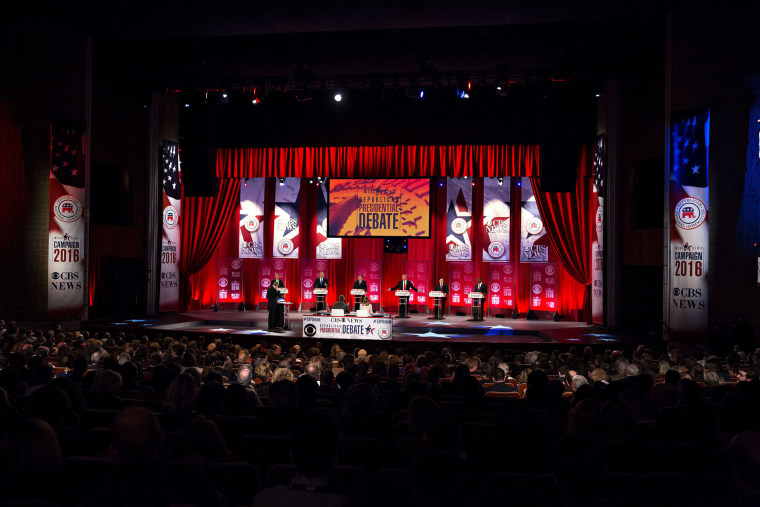In the 2012 race for the Republican presidential nomination, debate audiences became the unexpected focus of scrutiny. Most of the focus was on the GOP candidates, but on multiple occasions, Republican crowds themselves became part of the story.
Four years later, debate audiences have generally been on their best behavior, though on Saturday night in South Carolina, the debate's spectators once again worked their way into the spotlight.
Indeed, it was some of the candidates who ended up sparring a bit with the assembled crowd. When Jeb Bush received some hearty applause during the debate, Donald Trump said, pointing to the spectators, "Just so you understand, you know what that is? That's Jeb's special interests and lobbyists talking."
Soon after, in response to booing, Trump spoke directly to the crowd: "I only tell the truth, lobbyists."
Later in the same debate, Ted Cruz noted that Marco Rubio partnered with Chuck Schumer on comprehensive immigration reform, which generated another round of booing. Cruz, referencing the audience, said the "Rubio-Schumer amnesty plan" was "apparently supported by the donor class" -- i.e., the folks in the room jeering him.
It wasn't long before it became obvious that the loudest attendees loved Jeb Bush and Marco Rubio, and had no use for Ted Cruz and Donald Trump. The heckling and hollering got a little ugly -- Political Wire's Taegan Goddard said it felt like the debate "was taking place in a Roman coliseum" -- and even Republicans like David Frum lamented the fact that the audience was "joining in the bloodbath."
So, what was going on there? Trump complained yesterday about how the tickets were distributed, and as it turns out, he might have a legitimate point. The Huffington Post reported that the way in which the RNC distributed the tickets "may have been behind the heightened reactions."
According to RNC spokesman Sean Spicer, 600 tickets -- of the available 1,600 seats in the Peace Center -- were reserved for the candidates' supporters and friends. That number is more generous than in previous debates. The RNC got 367 tickets, and 550 seats went to state GOP and local officials. Moreover, local party officials apparently decided to forgo a lottery system in favor of giving loyal supporters tickets due to the venue size, according to Chad Groover, chairman of the Greenville County Republican party.
Or as Vox's report put it, most tickets "went to elected Republican officials, donors, and other workers for the party picked by local, state, and national party officials."
The result was an audience packed with leaders from the party establishment -- and as has been clear for quite a while, the party establishment likes Rubio and Bush, and dislikes Trump and Cruz.
As for the viewers at home, the debate reportedly drew a television audience of 13.51 million, which makes it the fourth most watched debate of the nine Republican gatherings, and the most since the CNBC debate in October.
